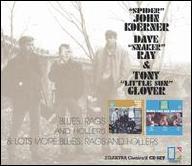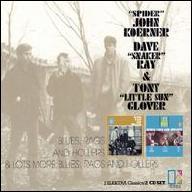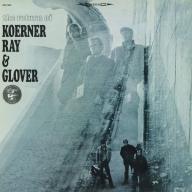The three of them were college students attending the University of Minnesota, immediately drawn together by their common interests in the music and by the close-knit folk community that existed back then. As was their wont, they all decided to append their names with colorful nicknames; there was Spider John Koerner, the Jesse Fuller and Big Joe Williams of the group, Dave Snaker Ray, a 12-string-playing Lead Belly aficionado, and Tony Little Sun Glover on harmonica, holding up the Sonny Terry end of things. This simple little act of reinvention resonates up to the present day, with myriads of white practitioners throwing their mundane appellations out the window to recast themselves as something along the lines of Juke Joint Slim & the Boogie Blues Blasters.
They worked in various configurations within the trio unit, often doing solo turns and duets, but seldom all three of them together. Their breakthrough album, Blues, Rags and Hollers, released in 1963, sent out a clarion call that this music was just as accessible to white listeners -- and especially players -- as singing and strumming several choruses of "Aunt Rhody." While recording two excellent follow-ups for Elektra, both Koerner and Ray released equally fine solo albums. Tony Glover, for his part, put together one of the very first instructional books on how to play blues harmonica (Blues Harp) around this time, and its excellence and conciseness still make it the how-to book of choice for all aspiring harmonica players.
While Koerner, Ray, and Glover each pursued individual careers, they continued to reunite for live shows. In 2002, Ray died from from lung cancer. He was 53 years old. In 2008, the trio was inducted into the Minnesota Blues Hall of Fame. Tony Glover died on May 29, 2019. ~ Cub Koda, Rovi




















